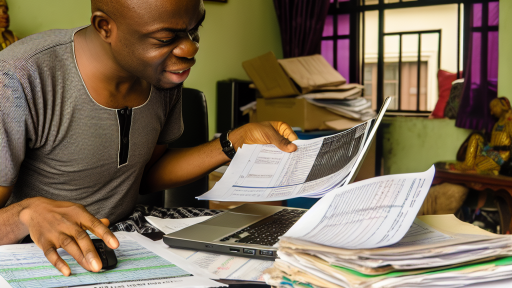Introduction
Legal and Tax Advice for Freelancers in Nigeria is essential for navigating obligations and minimizing risks.
Understanding these responsibilities ensures compliance and financial stability.
Legal advice helps freelancers avoid disputes and protect their rights.
Knowing the laws governing contracts, intellectual property, and business registration is essential.
Tax advice is equally important.
Freelancers must understand their tax obligations, including income tax and VAT.
Ignoring tax duties can lead to penalties and financial losses.
Freelancers should:
- Learn about contract laws and how to create legally binding agreements.
- Understand intellectual property rights to protect their work.
- Familiarize themselves with tax requirements, including filing deadlines and deductions.
- Consider registering their freelance business to gain credibility and access to certain legal protections.
In this blog post, we will explore essential legal and tax advice tailored for Nigerian freelancers.
You’ll gain insights into how to protect your work, comply with tax laws, and ensure your freelance business thrives.
Whether you’re new to freelancing or looking to improve your legal and tax knowledge, this guide will provide valuable information.
Stay informed, take control of your legal and tax obligations, and succeed as a freelancer in Nigeria.
Understand Nigeria’s Tax Laws
Freelancers in Nigeria must comply with several tax obligations.
Understanding these taxes is essential to avoid legal issues.
Types of Taxes Freelancers Must Pay
- Personal Income Tax (PIT): Freelancers pay PIT based on their income.
This tax is managed by the State Inland Revenue Service (SIRS). - Value Added Tax (VAT): If you provide goods or services, you’re required to charge and remit VAT, typically at 7.5%.
- Corporate Income Tax (CIT): If you register your freelancing as a business, you must pay CIT on your profits.
Key Tax Rates and Deadlines for Freelancers
- Personal Income Tax Rates: PIT rates range from 7% to 24%, depending on your income bracket.
- VAT Remittance: Freelancers must file VAT returns monthly, no later than the 21st of each month.
- Corporate Income Tax Rates: CIT is typically 20% for small businesses and 30% for larger businesses.
Tax Exemptions for Freelancers
- Low-Income Earners: Freelancers earning below the tax threshold may be exempt from PIT.
- Small Businesses: Freelancers classified as micro-businesses may qualify for tax relief on their income.
Tips to Stay Compliant with Tax Laws
- Register with the Tax Authorities: Ensure you register with the SIRS or FIRS to obtain a Tax Identification Number (TIN).
- Keep Accurate Financial Records: Maintain detailed records of your income, expenses, and tax payments.
- Set Aside Tax Funds: Regularly set aside a portion of your earnings for tax payments to avoid last-minute pressure.
- File Tax Returns Promptly: File returns by the required deadlines to avoid penalties and interest.
- Seek Professional Advice: Consult a tax advisor to help you navigate complex tax rules and deductions.
Understanding and complying with Nigeria’s tax laws is crucial for freelancers.
Stay informed and proactive to avoid penalties.
Registering as a Freelancer
As a freelancer in Nigeria, registering your business is a crucial step towards legitimizing your operations and ensuring compliance with legal and tax regulations.
Understanding the process of registering as a freelancer, the benefits of formalizing your freelance business, and the steps involved in registering with the appropriate authorities are essential for your success in the freelance industry.
Process of Registering as a Freelancer in Nigeria
- Choose a Business Name: Select a unique and suitable name for your freelance business.
- Business Structure: Determine the legal structure of your business (e.g., sole proprietorship or partnership).
- Register with the Corporate Affairs Commission (CAC): Submit the necessary documents to CAC for business incorporation.
- Obtain Tax Identification Number (TIN): Apply for TIN from the Federal Inland Revenue Service (FIRS) for tax purposes.
- Open a Business Bank Account: Separate your personal and business finances by opening a dedicated business account.
Benefits of Formalizing Your Freelance Business
- Legal Recognition: Registered freelancers have legal standing and can enter into contracts and agreements.
- Tax Compliance: Formalized businesses are required to pay taxes, which can be beneficial in the long run.
- Access to Funding: Registered businesses may qualify for loans and grants to grow their freelance ventures.
- Professional Image: Clients trust formalized businesses more, leading to increased opportunities.
Step-by-Step Guidance on Registering with the Appropriate Authorities
- Visit the Corporate Affairs Commission (CAC) website to learn about the registration process.
- Prepare the required documents, such as a valid ID, passport photograph, and business name reservation.
- Fill the necessary forms online or in person at the nearest CAC office.
- Pay the registration fees and submit the completed forms along with the supporting documents.
- Wait for approval from CAC and receive your Certificate of Incorporation.
- Apply for a Tax Identification Number (TIN) from the Federal Inland Revenue Service (FIRS) for tax purposes.
- Open a business bank account with the Certificate of Incorporation and TIN.
By following these steps and formalizing your freelance business, you can enjoy the benefits of legal recognition, tax compliance, access to funding, and a professional image in the freelance industry in Nigeria.
Read: A Step-by-Step Guide to Getting Your Tax Residency Certificate in Nigeria
Contracts and Agreements
Importance of Written Contracts
It is essential to have written contracts with clients to avoid misunderstandings.
Written agreements help define expectations, and responsibilities, and protect both parties.
Key Elements in Freelance Contracts
- Project Scope: Clearly outline the work to be done.
- Timeline: Set deadlines for deliverables and milestones.
- Payment Terms: Specify payment schedule and methods.
- Revisions: Define the number of revisions included in the project.
- Termination Clause: Include conditions for ending the contract.
Tips to Protect Your Rights
- Keep records of all communication and agreements.
- Get a signed contract before starting any work.
- Consider consulting a legal expert to review your contracts.
- Be clear about ownership of work and usage rights.
- Address any potential issues or disputes in the contract.
Avoiding Legal Disputes
To avoid legal conflicts, ensure that your contracts are clear and comprehensive.
Seek legal advice if you encounter any issues or breaches of contract.
Maintain professionalism in all client interactions to prevent misunderstandings.
Regularly update your contracts to reflect changing project requirements.
Read: Freelance Contract Law: Nigeria’s Legal Framework

Intellectual Property Rights
Importance of Protecting Your Intellectual Property as a Freelancer
Protecting your intellectual property is crucial as a freelancer in Nigeria.
Your creative works, designs, inventions, and brand identity are valuable assets.
Without proper protection, others can use or claim your work without permission.
Safeguarding your intellectual property ensures you maintain control, receive recognition, and gain financial benefits.
Types of Intellectual Property Rights in Nigeria
Freelancers should understand the various types of intellectual property (IP) rights available:
- Copyright: Copyright protects original literary, musical, artistic, and digital works.
As a freelancer, your written articles, logos, and software codes are protected by copyright laws. - Trademark: Trademarks protect brand names, logos, and symbols distinguishing your services.
Registering a trademark helps build your brand identity. - Patent: Patents protect new inventions and unique processes.
If you create innovative technology or methods, obtaining a patent is essential. - Industrial Design: Industrial designs protect the visual appearance of products.
Freelancers in creative industries, such as fashion design, benefit from this protection. - Trade Secrets: Trade secrets cover confidential business information like customer lists or unique strategies.
As a freelancer, keeping sensitive information secure is crucial.
How Freelancers Can Safeguard Their Creations and Ideas
Freelancers can take specific steps to protect their intellectual property:
- Register Your IP: Register your work with relevant authorities, like the Nigerian Copyright Commission or the Trademarks, Patents, and Designs Registry.
Registration gives you legal recognition and proof of ownership. - Use Contracts and Agreements: Always use written contracts specifying ownership rights.
Clearly state that you retain ownership of your work or transfer rights based on agreed terms. - Keep Records and Documentation: Maintain thorough records of your creations, drafts, and communications.
This documentation can serve as evidence in case of disputes. - Use Watermarks and Copyright Notices: Add watermarks to visual content and include copyright notices in written work.
These discourage unauthorized use and clarify your ownership. - Monitor and Enforce Your Rights: Regularly monitor where and how your work is used.
If you find any unauthorized usage, take action by sending cease-and-desist notices or pursuing legal remedies. - Seek Legal Advice: Consult an intellectual property lawyer to ensure your rights are adequately protected.
Legal experts provide guidance on registration and handling infringements.
Protecting your intellectual property as a freelancer secures your hard work and boosts your career.
Understanding Nigerian IP rights and taking proactive measures keeps your creations and ideas safe, giving you a competitive edge.
Read: Nigeria’s Tax Reforms and Their Impact on Freelancers
Liability and Legal Risks
Freelancing in Nigeria offers flexibility and independence but comes with potential legal risks.
It is crucial for freelancers to understand these risks and take necessary precautions to protect themselves.
Common Legal Risks Freelancers May Face
- Breach of Contract: Disputes may arise if clients feel you didn’t meet agreed terms.
Clear contracts are vital. - Intellectual Property Issues: Using copyrighted material without permission can lead to legal action.
Always ensure proper rights and licenses. - Non-Payment: Clients may refuse to pay, leaving you vulnerable.
Strong contracts with clear payment terms can reduce this risk. - Client Disputes: Unclear expectations can lead to disagreements.
Setting clear deliverables and timelines from the start helps prevent conflicts.
Importance of Professional Liability Insurance
Professional liability insurance, also known as errors and omissions insurance, is essential for freelancers.
This coverage protects you if a client claims your work caused them financial loss.
In Nigeria, legal fees and compensation claims can be costly.
Insurance provides a safety net, covering legal defense costs and settlements.
It’s a small investment that can save you significant financial stress in the future.
Tips to Limit Legal Liability and Protect Your Assets
- Use Detailed Contracts: Always use written contracts that outline project scope, payment terms, and deadlines.
Contracts protect both you and your client, reducing misunderstandings. - Consult a Legal Professional: Before signing contracts, have a legal expert review them.
This ensures you’re not agreeing to unfair terms or exposing yourself to risks. - Separate Business and Personal Finances: Open a dedicated bank account for your freelancing income and expenses.
Keeping finances separate protects personal assets if legal issues arise. - Maintain Accurate Records: Keep organized records of contracts, communications, and payments.
Proper documentation can support your case in the event of a dispute. - Register Your Business: Registering your freelancing as a business entity can provide added legal protection.
Limited liability companies (LLCs) help shield personal assets from business-related lawsuits.
Freelancers in Nigeria must be proactive in managing liability and legal risks.
By using clear contracts, securing professional liability insurance, and following protective practices, you can safeguard your business and personal assets. S
taying informed about potential legal challenges is crucial for long-term freelancing success.
Being prepared today helps prevent costly legal troubles tomorrow.
Read: Nigeria’s Legal System: What Freelancers Need to Know
Record-Keeping and Bookkeeping
Importance of maintaining accurate financial records as a freelancer
As a freelancer in Nigeria, maintaining accurate financial records is crucial for managing your business effectively.
By keeping detailed records of your income, expenses, and taxes, you can stay organized and compliant with legal requirements.
Guidance on how to organize and manage financial documents
To ensure proper record-keeping, it is essential to have a system in place to organize and manage your financial documents.
Set up a filing system to categorize receipts, invoices, and bank statements.
This will help you track your income and expenses, and provide evidence in case of an audit.
Recommendations for bookkeeping tools and software for freelancers
There are several bookkeeping tools and software available that can streamline this process for freelancers.
Browsing through options like QuickBooks, Wave, or FreshBooks can help you find the right fit for your business.
These tools offer features like expense tracking, invoicing, and financial reporting to simplify bookkeeping tasks.
Consider investing in accounting software that integrates with your bank accounts and other financial platforms.
This will enable you to automatically import transactions, reconcile accounts, and generate financial reports efficiently.
By using technology to manage your finances, you can save time and reduce the risk of errors in your record-keeping.
Regularly review and update your financial records to ensure accuracy and compliance with tax laws.
Keep track of deadlines for filing tax returns and making payments to avoid penalties or interest charges.
By staying organized and proactive in your bookkeeping practices, you can effectively manage your finances as a freelancer in Nigeria.
Seeking Legal Advice
Freelancers should never hesitate to seek legal advice when they are unsure about any legal matters that may affect their work or business.
It is always better to be safe than sorry.
Benefits of Consulting with a Lawyer
- Legal expertise: Lawyers specialized in freelance law can provide valuable insights and guidance on how to navigate legal issues specific to freelancers.
- Protection: Consulting with a lawyer can help freelancers protect their rights and interests in case of any disputes or legal challenges.
- Peace of mind: Knowing that you have received sound legal advice can give freelancers peace of mind and confidence in their business decisions.
Resources and Tips for Finding Reputable Legal Counsel
- Referrals: Ask colleagues or other freelancers for recommendations on trustworthy lawyers who have experience in freelance law.
- Online directories: Utilize online directories that list lawyers specializing in freelance law and read reviews from past clients.
- Consultations: Schedule consultations with multiple lawyers to discuss your needs and assess their expertise, communication style, and fees.
- Cost considerations: Discuss the cost of legal services upfront and inquire about payment plans or options for freelancers on a budget.
Ultimately, seeking legal advice as a freelancer is a proactive step towards ensuring compliance with regulations, protecting your business interests, and securing peace of mind in your freelance career.
Conclusion
Freelancers in Nigeria must prioritize compliance with legal and tax regulations to avoid penalties.
It is essential to stay informed about the requirements and obligations that come with freelancing.
By adhering to the laws, freelancers can protect their businesses and assets from legal risks.
Taking proactive steps such as proper record-keeping and seeking professional advice can help freelancers navigate the complexities of the Nigerian legal and tax landscape.
Overall, it is crucial for freelancers to understand their rights and responsibilities to operate successfully within the legal framework.
Compliance not only safeguards their business but also ensures a smooth and sustainable freelance career in Nigeria.




